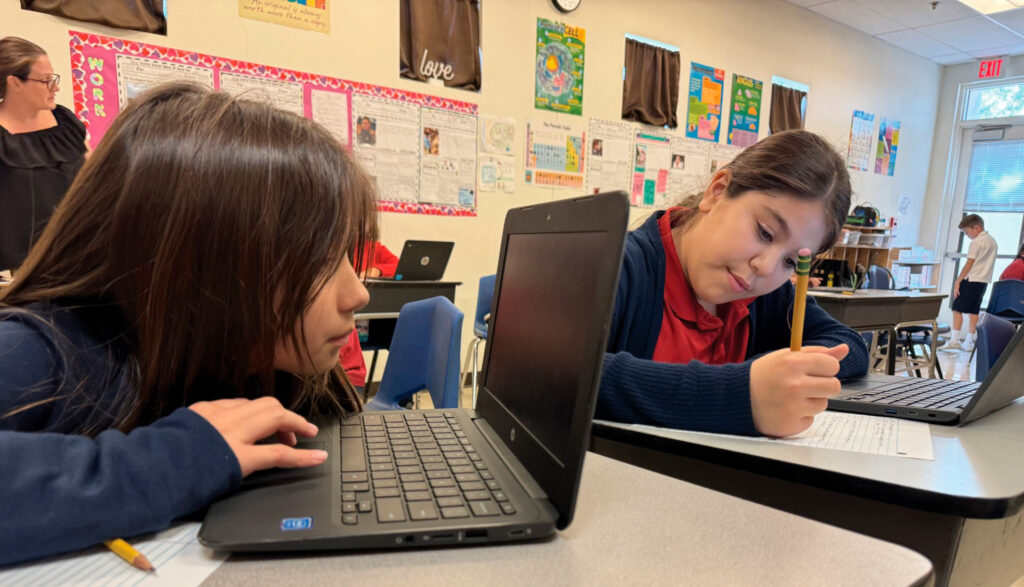In the past several decades, we have witnessed the unimaginable growth of digital technology. Exacerbated by the pandemic, children’s screen time increased precipitously.
Youngsters spend a considerable amount of time on social media, including Snapchat, Instagram, and TikTok. With the wide use of digital technology, it is becoming increasingly challenging to monitor and restrict young children’s use of screen time.

WHAT TOUCH-SCREEN TECHNOLOGY GETS WRONG
NONVERBAL COMMUNICATION
How many of us have texted jokes that fall flat? We all have experienced this, and we all know why — the text does not communicate emotions as well as our face does.
Screentime cannot teach in-person nonverbal cues.
Without exposure to in-person interaction, children lose not only the ability to communicate complex emotions but also the ability to recognize them. While emojis do a lot, they will never substitute for the many nuances of the human face.
SOCIALIZATION AND ISOLATION
It is best to think of social media platforms as what the schoolyard and the lunch tables functioned as for our generation. Social media is a deep socialization force, a 24/7 popularity contest where no one, even influencers, feels like a winner.
These social media platforms can exacerbate social isolation and lead to a false sense of failure. Spending more time on social media (two hours daily) leads to more social isolation. We cull the best of us and post that for viewership. Only we know the authentic true self, but we believe everyone else’s lie.
DIGITAL DEVICES DO PROVIDE BENEFITS
While substituting text-based interaction for in-person is problematic, a modest amount of time spent on devices can have benefits. Parents of all incomes now have access to excellent learning apps. Preschoolers enjoy learning the alphabet, the letter sounds, and counting numbers by watching videos.
Even though replacing sports with electronic games has correlated with a rise in obesity, digital devices help develop fine motor skills.
These platforms can have a function we never had growing up. Youngsters can find opportunities to interact with like-minded friends with similar hobbies and interests. They can FaceTime their relatives, aunts, uncles, and grandparents. They interact with individuals and learn to read and understand others’ facial expressions and form a bond with them.
Connecting with friends on social media gives youngsters a sense of community. More people can find unique social groups. People can feel seen and supported. Many share their struggles, and many more share inspirational quotes.
There are innumerable ways screen-based technology can and has benefitted child development. Children also use technology to take courses, make academic gains, and
learn writing and communication skills. The use of technology brings a wealth of information to their fingertips.
HOW TO RESPONSIBLY PARENT SCREENTIME
I know what you are thinking — the good contradicts the bad. What to do? Well, a good metric is asking yourself if screen-based interaction is substituting something meaningful or essential. Is it skill avoidance?
If you ask whether it is proper to use screens to get children from point A to point B, what are they missing out on? Do you find it essential that children notice the countryside or learn to navigate? Or are we asking a lot of children to do something we don’t do ourselves?
By design, children’s minds crave stimulation. So, how do you set limits? First, be an active part of your child’s use of screens. Make conscious, intentional decisions about a child’s use. Don’t allow children under 18 months old to use screens. Select educational and high-quality programs and limit the screen time to one hour daily for children ages two to five.
Second, to guide the effective use of screen time, parents should preview the programs, games, and apps and be involved with their children while they play games or use digital devices (Common Sense Media). Parents should coach children about advertisements and their influence. Parents should set clear parameters for children’s use of digital devices, including TV time, just before going to sleep.
In-person interactions and spontaneous play should not be replaced by screen time. However, screen time can be beneficial in honing many skills for developing children.
To learn more about Self Development Preschool, please contact (480) 396-3522. For the accelerated K-8 program, Self Development Academy, please contact Self Development Academy at (480) 641-2640.


